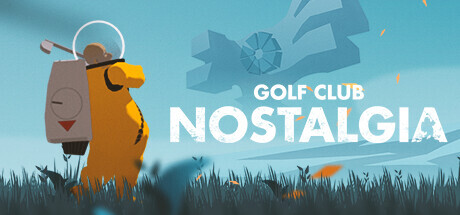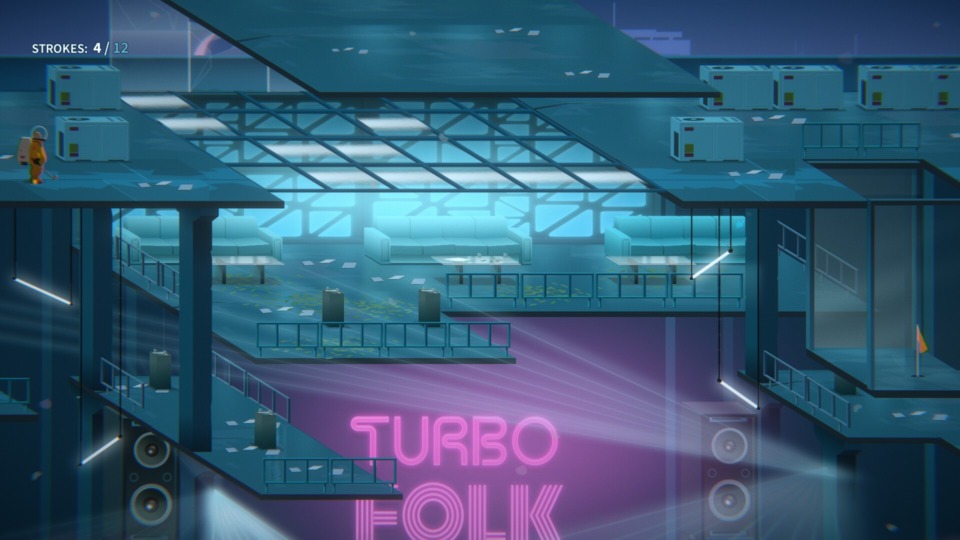Indie Game of the Week 355: Golf Club Nostalgia
By Mento 1 Comments

If I ever make an exception for sports games on this feature, it's usually because they've got something else going on. Like an abstraction in its premise, or a heavier emphasis on story, or some kind of ridiculous fantastical gimmick to hang some non-standard sports game mechanics upon. In that sense, Golf Club Nostalgia (formerly Golf Club Wasteland) from Demagog Studio—where you're playing a round of 18 (well, 35) holes across the dilapidated remains of a post-apocalyptic Earth—reminded me of Sidebar Games's Golf Story in that, while golf is in the title and you certainly do play a lot of it, the package as a whole is not really just about the sport variously known as the King's Game and Ball Chess. Unfortunately with both games, that lack of focus also means that—were you to treat it as a serious golf game—it'll fall short of expectations with its attention spread elsewhere.
As stated, Golf Club Nostalgia is a 2D golfing game where each course is set in a different ruined location on Earth that your spacesuited golfer will jetpack his way through to take the next shot. Much of the time you'll need to carefully aim the direction and apply the right amount of power to get the ball to some precarious spot or another, often nestled between obstacles and water hazards that will destroy the ball and require another swing from your current position. The controls are simple enough: hold back in a direction to aim the shot and the amount of distance you hold back determines the power you put into the swing, and then confirm with the action button once everything looks good. Some courses have little surprises that might occasionally help you: sending a ball down a pipe might drop it much closer to the hole (or, occasionally, further away) while hitting a switch could open an obstructing door or a fragile window might prove to be a shortcut with a strong enough drive. The animals roaming around the otherwise empty planet might help or hinder your score as well, carrying the ball to more advantageous spot or just eating it.

However, Golf Club Nostalgia has much more going on in the background. The protagonist goes unnamed for much of the game but you learn more about him gradually from diary entries after every hole (retrieving the full entries of which might require going under a shot or two under par as an incentive to improve) and in the process learn how humanity reached the unfortunate position it did where it had to abandon Earth after it became inhabitable and instead fled to Mars, in relatively small groups of only the richest and most connected that could acquire tickets. This is conveyed not just through these journals but by the protagonist's favorite radio station, Radio Nostalgia from Mars, which he's been able to pump through his EVA suit's headset as he silently takes to his golfing. The radio goes through two shows on a loop, approximately 20-30 minutes long each, and comprises of music, guests reminiscing about their former lives on Earth (hence the Nostalgia name), and a smooth-voiced continuity announcer that frequently drops PSAs about the highly restrictive laws the populace must abide by to survive their current, probably untenable status as citizens of the barren red planet. We also learn that our protagonist is as enervated by life on Mars as anyone; he's a figure of some importance, yet he ekes out a sorrowful lifestyle burdened by the survivor's guilt he feels towards the many he was forced to leave behind including his own family. While it initially appears that he's a member of the idle rich who travelled back to Earth at great expense for this extravagant frippery of an interplanetary golfing trip, the truth is revealed to be something a bit more personal and bleak.
Speaking of which, though the premise would suggest some black humor, there's something about the sensibility of the game's eastern European developers (Demagog Studio hails from Serbia) that really hammers home the loneliness, the desperation, and the psychological harm that comes with abandoning one's homeworld for a duration-unknown stay of execution floating in space, knowing that your rich buddies with whom you share this fate are in some way responsible for the capitalism-driven ecological catastrophe that finally rendered Earth inhospitable and the many billions of human lives that were sacrificed on the altar of infinite corporate growth. Most of the wistful testimonials on Radio Nostalgia from Mars come from what sound like the most privileged, oblivious, upper-class citizens who mourn the demise of their lavish lifestyles more than they do the many hundreds of people they must've known by name that were unable to join them on the evacuation rockets, though a few have more human stories about being lucky enough to sneak aboard or how they were a child when they were saved and can only recall bits and pieces of their time on terra firma; it later becomes evident that, while he presumably enjoys listening to the music, the protagonist thinks very little of his fellow survivors—however, it takes the player perhaps a little longer (and a bit more of the backstory of this very exclusive rescue mission for the necessary context) to realize the vapid selfishness of (most of) these speakers. The music's kinda interesting too: being all about waxing lyrical about the good old days, Radio Nostalgia is set up like an oldies channel with its softly-spoken host and gentle platitudes, but the music is as artsy and contemporary as it gets with its combination of EDM and philosophical novelty songs—an attempt to create the type of future music those born after the Zoomer generation would hypothetically grow up with and nostalgically seek out in their advanced years.

I'll be frank, while I appreciate a lot of the game's worldbuilding and its mature (if hopelessly depressing) epistolary storytelling actually playing the game as a serious golf sim is an exercise in endless frustration. It's very difficult to accurately understand how far a ball will go when driving because the game deprives you of the usual dotted lines that simpler golf games might give you to judge a ball's trajectory, and as the protagonist is a dying middle-aged man (and perhaps too used to Mars's lower gravity) he's barely capable of hitting the ball more than 50 yards, which is often woefully short of the distances you'll need to hit when safe landing spots become few and far between. The behavior of the ball is hard to predict too: sometimes you'll have the ball run across a metal grate with holes (such as those on walkways) and hit maximum friction quickly, while other times it'll continue bouncing and rolling way further than you'd expect. The unexpected stage hazards can be fun surprises but will often, of course, mess up your attempts. Worst of all is that there's a very long delay when pausing the game, which you'll want to do frequently in order to start over if you're trying for par and have hit an out-of-bounds state one too many times; that there isn't a button that can instantly restart the current hole (with perhaps a "yes/no" prompt in case it was clicked by accident) seems like a major lapse in player UI considerations. That some holes have a 15-to-20-stroke par makes them way too long: you could spend fifteen minutes getting gradually closer to the hole only to have to start over once in putting distance after finally running out of strokes. The game offers a "story mode" where there's no obligation to reach par and you can continue to bash your head against a certain shot ad nauseam if preferred; I'd probably opt for that approach if I had to play the game all over again (and if you're really concerned enough about achievements to play the more punishing Challenge Mode where you can only pass a stage by getting par or under, the last achievement requires playing the full game again under par with no restarts so good luck with that). I might just have a low tolerance for golf games in general but I didn't care for playing Golf Club Nostalgia at all; however, there's enough going on in the periphery that I can't foster too much animosity against it either. Philosophical, maudlin, and deeply deeply irritating. Hey, I think I have my new Tinder tagline.
Rating: 3 out of 5.
| < Back to 354: Ary and the Secret of Seasons | 001-100 | 101-200 | 201-300 | > Forward to 356: Suzy Cube |
